Chronology
Chronology is the science of arranging events in their order of occurrence in time. It is an important concept in history, science, and many other fields. Understanding chronology helps us make sense of the past and present, and it allows us to analyze and interpret historical events and scientific phenomena in the correct sequence.
Key Concepts to Understand
- Timeline: A visual representation of a chronology, typically showing events in chronological order along a line or axis.
- Relative Dating: The process of determining the age of an object or event in relation to other objects or events, without necessarily determining their absolute age.
- Absolute Dating: The process of determining the exact age of an object or event, often using scientific methods such as radiometric dating.
- Eras and Periods: Divisions of time used by historians and scientists to categorize and study different stages of history or natural history.
Study Guide
To understand and master the concept of chronology, consider the following study guide:
- Learn to create and interpret timelines. Practice placing historical events, scientific discoveries, and natural phenomena in chronological order.
- Understand the principles of relative dating and absolute dating. Explore the methods used in archaeology, geology, and other scientific disciplines to determine the age of objects and events.
- Study the major eras and periods in history and natural history. Familiarize yourself with significant events and developments that characterize each era or period.
- Practice applying chronology to historical narratives and scientific explanations. Consider how understanding the sequence of events can enhance our comprehension of historical and scientific phenomena.
By mastering the concept of chronology, you will develop a deeper understanding of the temporal relationships between events and gain valuable insights into the historical and scientific processes that have shaped the world we live in.
.◂Science Worksheets and Study Guides Third Grade. Hands-on Lab Skills/Science Inquiry - 3rd grade
Study Guide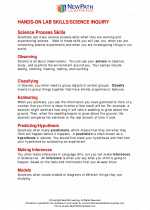 Hands-on Lab Skills/Science Inquiry - 3rd grade
Hands-on Lab Skills/Science Inquiry - 3rd grade  Worksheet/Answer key
Worksheet/Answer key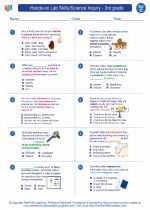 Hands-on Lab Skills/Science Inquiry - 3rd grade
Hands-on Lab Skills/Science Inquiry - 3rd grade  Worksheet/Answer key
Worksheet/Answer key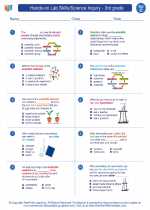 Hands-on Lab Skills/Science Inquiry - 3rd grade
Hands-on Lab Skills/Science Inquiry - 3rd grade  Worksheet/Answer key
Worksheet/Answer key Hands-on Lab Skills/Science Inquiry - 3rd grade
Hands-on Lab Skills/Science Inquiry - 3rd grade  Worksheet/Answer key
Worksheet/Answer key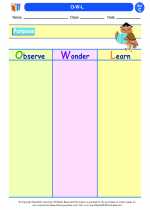 O-W-L
O-W-L  Vocabulary/Answer key
Vocabulary/Answer key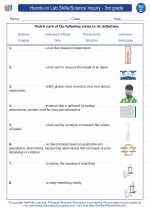 Hands-on Lab Skills/Science Inquiry - 3rd grade
Hands-on Lab Skills/Science Inquiry - 3rd grade  Vocabulary/Answer key
Vocabulary/Answer key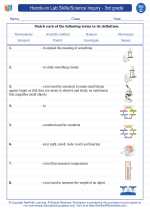 Hands-on Lab Skills/Science Inquiry - 3rd grade
Hands-on Lab Skills/Science Inquiry - 3rd grade 

 Worksheet/Answer key
Worksheet/Answer key
 Worksheet/Answer key
Worksheet/Answer key
 Worksheet/Answer key
Worksheet/Answer key
 Worksheet/Answer key
Worksheet/Answer key
 Vocabulary/Answer key
Vocabulary/Answer key
 Vocabulary/Answer key
Vocabulary/Answer key

The resources above cover the following skills:
Science as Inquiry and Process: A student should understand and be able to apply the processes and applications of scientific inquiry. A student who meets the content standard should:
Develop an understanding of the processes of science used to investigate problems, design and conduct repeatable scientific investigations, and defend scientific arguments.